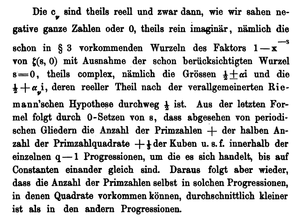Adolf Piltz
Adolf Piltz (8 December 1855[1] – 1940) was a German mathematician who contributed to number theory. Piltz was arguably the first to formulate a generalized Riemann hypothesis, in 1884.[2]
Adolf Piltz | |
|---|---|
| Born | 8 December 1855 Ilmenau, Saxe-Weimar-Eisenach |
| Died | 1940 |
| Nationality | German |
| Alma mater | University of Berlin University of Jena |
| Scientific career | |
| Fields | Mathematics |
| Institutions | University of Jena |
| Theses |
|
| Doctoral advisor | Ernst Kummer Karl Weierstrass Carl Johannes Thomae |

In Piltz's habilitation thesis (1884) the generalized Riemann hypothesis is mentioned.
Notes
- Dozenten-Album der Universität Jena: 1858 bis 1908. Neuenhahn. 1908. p. 25.
- Davenport, p. 124.
gollark: Right?
gollark: No other dragons have suddenly become ungendered though.
gollark: On a specific breed, though? How would TJ09 mess that up?
gollark: How *did* TJ09 manage to break this, I wonder...
gollark: Well, probably not. The trader might have but probably didn't.
References
- Davenport, Harold. Multiplicative number theory. Third edition. Revised and with a preface by Hugh L. Montgomery. Graduate Texts in Mathematics, 74. Springer-Verlag, New York, 2000. xiv+177 pp. ISBN 0-387-95097-4.
Further reading
- Steinbach, Matthias (2008). "'…durch jahrelange Versumpfung jeglichen Halt verloren…', Adolf Piltz (1855–1940)". In Steinbach, M.; Ploenus, M. (eds.). Ketzer, Käuze, Querulanten. Außenseiter im universitären Milieu (in German). Jena: Verlag Dr. Bussert & Stadeler. pp. 198–212. ISBN 9783932906848.
External links
This article is issued from Wikipedia. The text is licensed under Creative Commons - Attribution - Sharealike. Additional terms may apply for the media files.